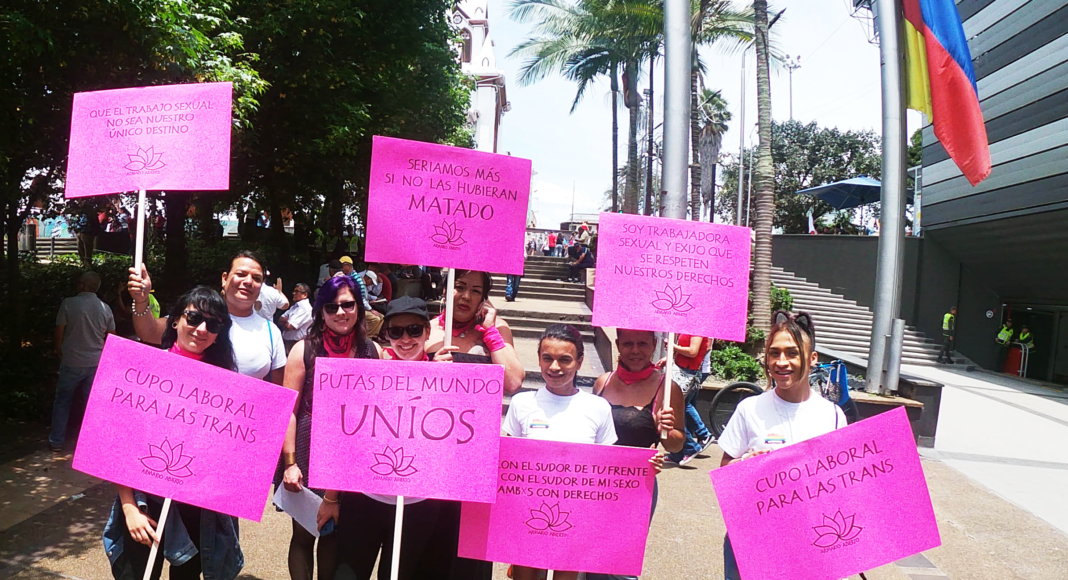Gender-based movement restrictions came into effect in Bogotá this Monday (13 April), permitting men and women to go out for essential trips on alternate days. The measure, announced last week by the city’s mayor Claudia López Hernández as an attempt to curb the spread of Covid-19, has received criticism from trans rights groups.
Bogotá is following in the footsteps of Panama and Peru, which implemented similar gendered restrictions on movement at the beginning of April. The response from trans community groups in all three countries has been unanimous: the measures put trans and non-binary people at risk.
“Those enforcing the measure are the police, who have a record of abusing minorities, and now they are policing gender too”
Cristina Rodríguez Romero
“It’s completely discriminatory,” said Cristina Rodríguez Romero, Colombian trans woman and employee at feminist organisation Fondo Lunaria. “Those enforcing the measure are the police, who have a record of abusing minorities, and now they are policing gender too.”
Guidelines released by mayor López Hernández state that transgender people will be allowed out according to their gender identity. However, there have already been reports of trans people being shouted out for being out on the street. Bogotá-based trans support group GAAT Foundation says that the measure “opens the door to discrimination and police abuse,” emphasising the comparable situation in Peru.
A ten-day gendered movement restriction was initiated in Peru on April 3, two days after Panama’s government began a thirty-day lockdown allowing women out for essential needs on Mondays, Wednesdays and Fridays, and men on Tuesdays, Thursdays and Saturdays.
“The armed forces and the national police will not use this measure as a pretext for homophobic conduct,” affirmed Peru’s President Martín Vizcarra when the restrictions came into place.
Gender, identity and discrimination
In both countries, the reaction from trans rights groups was instantaneous, urging governments to reconsider. Feminist pressure group Más Igualdad Perú affirmed that those responsible for enforcing the measures “don’t have sufficient human rights training and have a record of abusing their authority”.
Responding to concerns, Peru’s government ordered that identity controls for trans people would be based on their chosen gender, not on their legal gender.
Despite this, there were several reports of discrimination at the hands of the police. A video circulating on Twitter shows three trans women forced by the police to squat down with their arms out in front of them and repeat “I want to be a man.” “You in the middle, I can’t hear anything,” says the police officer.
The restrictions come at the same time as Peru was found guilty by the Inter-American court of Human Rights of the torture and rape of LGBTI person Azul Rojas Marín by police officials. The landmark ruling, made public on 6 April, orders the Peruvian government to pay Ms Rojas Marín compensation and take steps to prevent similar crimes from taking place in future.
In Panama too, concerns were quickly vindicated. On the first day of the restriction – designated for women to go out – trans woman Barbara Delgado was detained by the police for three hours. They accused her of not being a woman and she was fined US$50 for violating the quarantine, according to Human Rights Watch.
Panama requires proof of gender reassignment surgery before a person’s gender can be changed on official documents, a breach of international human rights law.
In Colombia, politicians have joined trans rights groups in criticising the gendered movement restriction implemented by the country’s first openly lesbian mayor. FARC senator Victoria Sandino wrote on twitter that the measure is “arbitrary and violent towards those with non-binary gender identities.”
Other regions in Colombia have opted to limit movement based on citizens’ ID card numbers. “This is difficult to implement in a city the size of Bogotá,” said López Hernández, “and it puts our police in danger as they have to come into contact with everyone to check their ID card.”
In Cartagena de Indias, a city in the north of Colombia, a more stringent movement restriction was also introduced on Monday, combining gender with ID card number to further reduce the number of people going out.
Peru rethinks
In Peru however, the government halted the measure early due to its lack of success. “It has not been effective,” said President Vizcarra, “It doesn’t make sense to keep it going.” One member of Peru’s Covid-19 operations team, Farid Matuk said he was wrong to introduce equal circulation days for men and women under the restriction: “in the patriarchal world we live in there are several roles assigned to women. Unfortunately, now is not the moment to combat them.”
“In general, the measures have reinforced female stereotypes and put a huge burden on women when it comes to childcare and domestic work, and now with the gendered movement restrictions it’s even harder.”
“The Covid-19 measures have the biggest impact on women and on the sexually diverse population,” said Ms Rodríguez Romero on Twitter and in a phone-call. “In general, the measures have reinforced female stereotypes and put a huge burden on women when it comes to childcare and domestic work, and now with the gendered movement restrictions it’s even harder.”
Persis Love is a freelance multimedia journalist with a particular interest in Latin America. She has written for the Financial Times, Latin News, New Left Review and Al Arabiya and is a former podcast production assistant at the Financial Times.
In 2017 she was nominated for BBC Arabic young journalist of the year for her documentary Then They Said: Refugee.
Main image: Trans women from the organization Armario Abierto (Open Closet) demonstrating in Manizales, Caldas, Colombia

